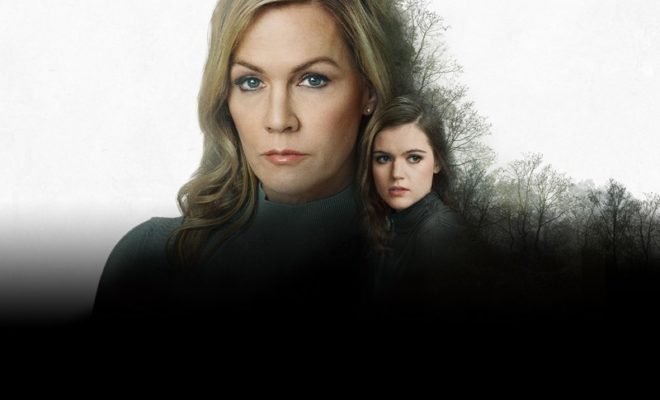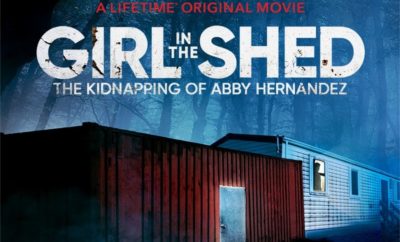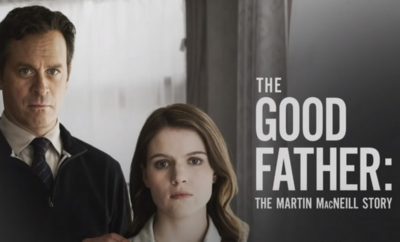
Interviews
Left for Dead: The Ashley Reeves Story
By: Lisa Steinberg
Q) Gloria, how does Left for Dead: The Ashley Reeves Story stand out compared to other films you have directed?
Gloria Ui Young Kim: It was such an important story, I think to tell. I was immediately drawn in by the script and by the strength of the script and the strength of the story of resilience. And I had so much support at all levels from the producer Jeff Vanderwal, at Cineflix, and from Lifetime, our Executive Chris Wade. I mean, we were all aligned in the story that we wanted to tell, and it was full steam a head. It was just really exciting.
Q) For Jennie this is such an intense role for you. How did you shake off a long day of filming this one?
Jennie Garth: Yeah, it was definitely a…so heart wrenching, especially, you know, being the mother of three young girls, this movie really tapped into a lot of very deep true emotions for me. So it was important for us to have as much fun as we could on the set and while working crazy, under the crazy time constraints…he was dealing with and kind of…Giving everybody their space to sort of go through everything that they needed to go through and then sort of let it all go at the end of….
Q) For Jennie and Anwen, I’d like to know how you two kind of worked on your relationship. Did you hang out at all outside of production or anything like that?
Anwen O’Driscoll: I mean, there it was hard to do a lot because there were COVID restrictions, of course. But we did, we did have a get together, Gloria, Jennie and I one time beforehand where we talked through everything and talked through our characters and the journey of the edge and had dinner one time. But it wasn’t too much because of COVID going on. We did a lot of it on set, which was great.
Gloria: With Jennie’s dog. And she brought her dog, so we all bonded.
Q) A lot of people refer to the many perils of Kelly Taylor – burned on drugs, stalked, kidnapped. When it comes to something like this do you draw a lot on all the drama you did on “90210?” I know it’s been a good number of years now, but did you find that good training as you look back to do a project like this?
Jennie: Working on camera sort of serve you as you get older and do more complex roles. Absolutely, yeah, my character went through so much on that show that there’s a lot there. Real life experience with being a mom and having a young daughter and just putting myself in this woman’s shoes and really kind of feeling this terrible tragedy firsthand. So, it was a combination.
Q) Anwen, your role seems very What that difficult at all for you? Did you have to work on your upper arm strength?
Anwen: Yes, it was. It was very challenging because I had never done something, so just like deep dive into something so physically and vocally challenging. We, Gloria and I, worked beforehand with an occupational therapist for physicality and vocal which really helps. And we also had a physical therapist on set sometimes which was great to remind me to do certain things, but I did practice a lot and watch as many videos as I could and I would take little videos and little clips of my voice and send it to Gloria and be like, what does this sound like? How does this sound like? Is this just trying to keep it consistent and accurate. I suppose I didn’t want to make it -I was afraid to make it kind of like a caricature thing, so I wanted to really get Gloria’s opinion and get everyone to tell me that it was OK.
Q) Gloria, can you give us insight as to what went into shaping the movie in terms of that you decided pretty early on to show that he was definitely or seemed to be the person that tried to kill her rather than making it more say of a mystery. Was it a boyfriend? Was it someone else?
Gloria: Yeah, I think it was really, really important. I think just to everyone involved that this be Ashley’s story, that this be the story of her resilience and her overcoming the obstacles, I think. This story was in the news. Everyone knew that it was. The person who it was that attacked her and you know, he was the one that led the police to her body. So, in some ways, the mystery aspect didn’t really quite work for this story and I think also just given the time that we’re living in, I think it’s just really, really, really important that women’s stories are in the forefront and that her actual story of survival was the story rather than the mystery story.
Q) Anwen, you were terrific in this. It’s just so, so, good. I was just wondering, one of the things you really seem to encapsulate with this whole performance was the frustration that your character went through. How much of it was frustrating for you?
Anwen: Well, one of the things that drew me when I first read the script, and write to Ashley herself, was I could connect with the feeling of not being believed by people. And that was one of her huge struggles throughout the movie, was not being heard and not being supported by a lot of people that were close to her. She did have some support by, you know, her mother. But I think it was because could really connect to that feeling so the frustrations were real and I couldn’t pull on that because it was a real thing that I’ve experienced in my own life, which is unfortunate, but it’s common and it happens all the time.
Q) Anwen, what did you learn or maybe take from after walking in Ashley’s journey?
Anwen: I was very inspired by her bravery. And playing the character because I wouldn’t say that I’m a very brave person or confrontational in real life, so getting to play that character and playing that truth of her really inspired me as a person, and I felt that it encouraged me to be braver. So, I feel like I pulled that from Ashley and learned that from Ashley herself. It’s great.
Jennie: Well, it’s definitely changing hats when you’re producing some. On all fronts, kind of calling the shots and in charge of things. So, I was very respectful of the producers that did such a great job with this film and Gloria, who did such a wonderful job directing it and trying to kind of zip it creatively and let them do their job and stand back and let me do my job. So, it was definitely changing gears but there is something refreshing about just being an actor for hire sometimes.
Q) Anwen, I’m just wondering how much time or how much interaction did you get to have with the real Ashley?
Anwen: I didn’t get to speak with her unfortunately. Maybe hopefully one day. But I did want to give space and I respected you know, her space. I wouldn’t want to come at her with this super heavy subject matter. It’s her story and I feel like maybe she’s done talking about that and done having people come at her about it so. I just did a lot of self-stuff and just tried to connect with her bravery and her heart and make that the focal point.
Q) Was there a part to playing her without having interacted, that made it a little better for you? Because you kind of were doing your own thing versus, if you had spoken to her, it would have been a different story.
Anwen: Yeah, it’s true. I think it allowed me to add a bit of myself into it and I liked doing that little combination of me and her together, I suppose.
Q) I was wondering, this is for Gloria mainly, but were the Reeves family -are they aware of the film and did you approach them at all and do they have any input into anything?
Gloria: Yeah, the Reeves family is aware of the film and it would have been Christina Welsh, the writer, and Jeff Vanderwal, the producer, who were the ones who had the relationship with her. They spent time with her and interviewed her. So, she was a part of the process. And in terms of my relationship, I just worked with the script and I worked with the materials that I had been sent and the stuff that I had done research online. We’re trying really hard to tell a respectful story.
Press Conference





You must be logged in to post a comment Login